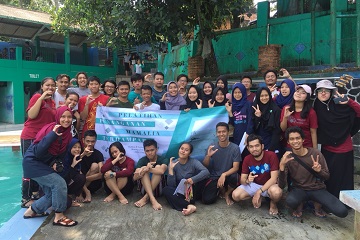Himasper IPB Held Training of Stranded Marine Mammals Handling

Students Association of Living Aquatic Resources Management, Bogor Agricultural University (Himasper IPB) held Training of Stranded Marine Mammals Handling. This event was held at Discussion Room Faculty of Fisheries and Marine Science, IPB Dramaga Campus, Bogor (8-9/9). This training also practiced at Cinangneng Swimming Pool.
Before learning about stranded mammals handling, the participants were invited to identify the types of marine mammals in advance. Researcher from Department of Marine Science and Technology (ITK FPIK IPB), Adriani Sunuddin, S.Pi., M.Si. explained the species of marine mammals in Indonesia. There are 35 species of marine mammals can be found in Indonesia marine waters. Marine mammals have the ability to hold their breath long enough to dive. That ability is supported by the peculiar anatomy and morphology they have. The eyesight of marine mammals is not very sharp. Marine mammals have the ability to turn the sensory system from visual to audio and to develop sound communication.
The proper care of stranded mammals is important. That is necessary to increase the animals’ live probability. Other than that, proper documentation can understand the management of conservation area, identify the activities in the marine waters that are not sustainable, and the distribution of marine animals in Indonesia. The marine mammals care in general is classified into two condition those are living condition and dead condition. The proper response of live stranded marine mammals is by rescue it. After the participants learned the theory, the simulation of marine mammals’ rescue practice was conducted both indoor and outdoor.
The case of marine mammals stranding can be caused by several things. Those include sickness, age, being preyed by predators, bad weather, disorientation (sea-quakes, sonar system interference, seismic activity, and liners’ noise), being directly caught, bombed, speared, accidentally caught in fishing net, bad sea water quality due to pollution, and collision with boats.
“The occurrences of stranded mammals lately were reported to us very often. Almost every month. This phenomenon has happened in various regions. More than 300 cases since 2000. This cannot be directly concluded that the natural conditions are not good. If we look at the positive impact, this happens because more people are aware about the importance of mammals stranding care,” conveyed conservationist from Whale Stranding Indonesia, Sheyka Nugrahani Fadela.
The Training of Stranded Marine Mammals Handling is one of working programs series of Division of Environmental and Social Himasper IPB which is named Career Development Training (CDT). CDT has two main activities those are Basic Training of ArcGIS Usage in Spatial Data Analysis and Mapping also Training of Stranded Marine Mammals Handling. Those both events were held separately. Basic Training of ArcGIS Usage was conducted first then followed by Training of Marine Mammals Stranding Care
This training was based on issues that often occurs in field of Living Aquatic Resources Management (MSP). The Basic Training of ArcGIS Usage was conducted to train participants’ softskill in developing map of fisheries in facing digital era. Another issue that is rife is the number of stranded animal cases. The Training of Stranded Marine Mammals Handling accommodated the participants’ interest on marine mammals. The objective of this training is to produce conservationists to perform the proper care to the occurrence of mammals stranding.
“As student from Department of MSP, we have responsibility to keep learning about the importance of managing the existing marine resources. Through this training we learned a lot about how to process spatial data, so it can be used properly as well as knowing the proper procedures for dealing with mammals stranding,” said Chief Executive of CDT Himasper IPB, Cheptia Amany. (qa)


